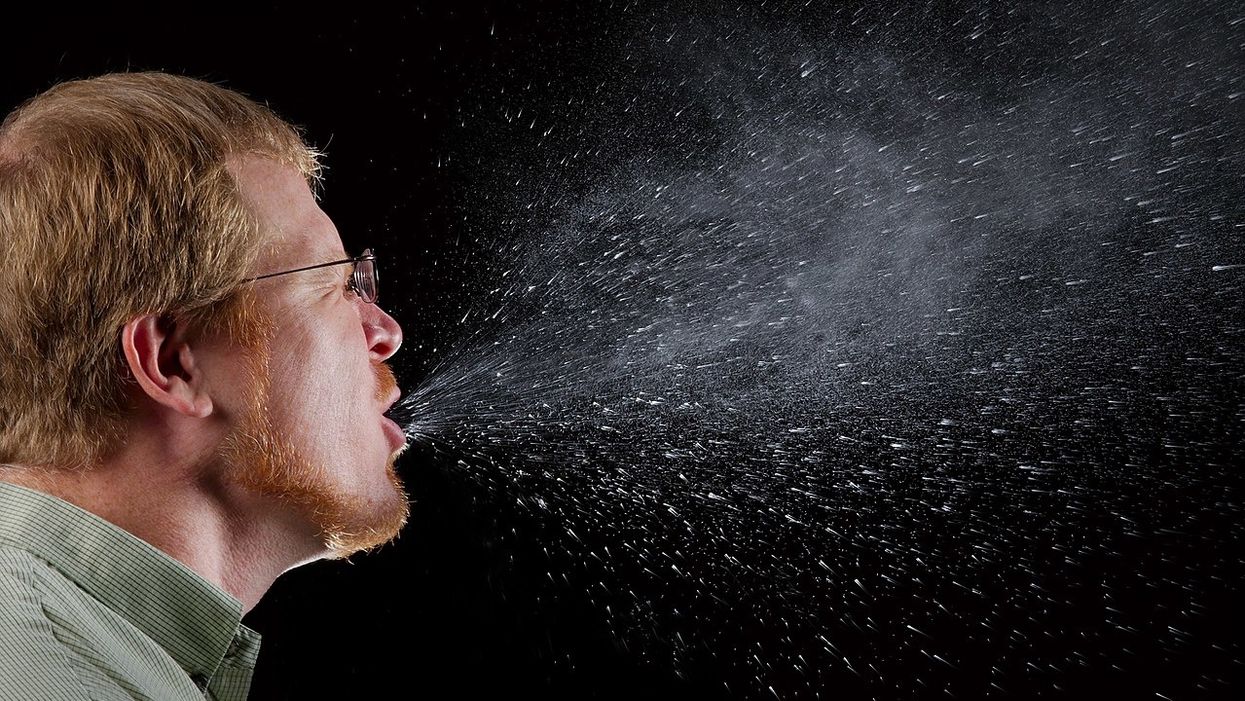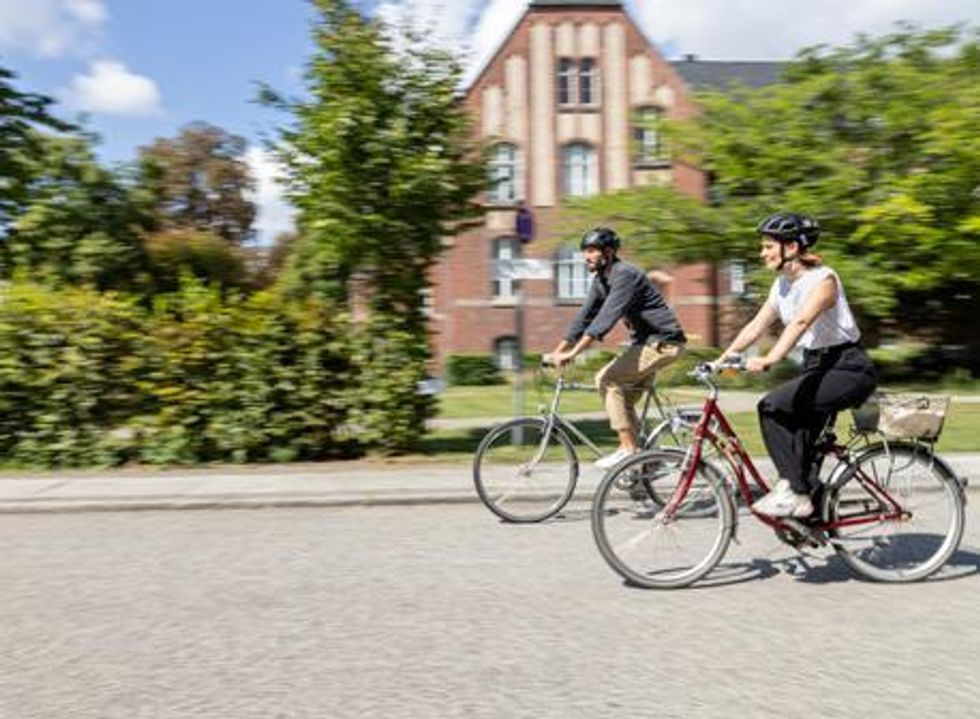Angry Citizens Pressure the World Health Organization to Fully Recognize COVID’s Airborne Spread

Aerosol scientists say that the evidence points to airborne transmission of COVID-19 "beyond any reasonable doubt."
A new citizen movement is gathering steam to try to convince the influential World Health Organization to change its messaging about how the coronavirus is transmitted.
The new petition "COVID is Airborne" (www.covidisairborne.org) started in early November and has approximately 3,000 signatures. During this particularly dangerous acceleration of the pandemic, the petition's backers allege that the WHO is failing the public with mixed messaging and thus inadvertently fueling the wildfire of transmission.
"Early on in the pandemic, [WHO Director General Dr. Tedros Adhanom Ghebreyesus] said that coronavirus is airborne, but then in March, WHO tweeted that COVID-19 is not airborne, saying that it is primarily transmitted via droplets that are too heavy to hang in the air," says petition co-creator Jessica Bassett Allen.
The organization's late March messaging, still available on social media, is a digital graphic saying, "FACT CHECK: COVID-19 is NOT Airborne".

Screenshot of WHO's Tweet from March 28, 2020 that is still published.
The petition asks for a course correct: "We, citizens of the world, request that the World Health Organization (WHO) recognize the compelling scientific evidence that SARS-CoV-2 spreads by aerosol transmission ("airborne") and urge the WHO to immediately develop and initiate clear recommendations to enable people to protect themselves."
In the vacuum of the WHO's inaction, aerosol scientists around the world scrambled to raise awareness of what they saw as a grave error.
"Almost immediately after that [March 28] announcement, we formed a group of 239 scientists from many countries and disciplines to convince them that they should acknowledge that there is airborne transmission, but we find that they are totally dead set against it," says Dr. Jose Jimenez, a chemistry professor at the University of Colorado at Boulder who has studied aerosols for 20 years. He supports the citizen petition.
In a letter to the WHO back in July, he and his colleagues wrote: "Studies by the signatories and other scientists have demonstrated beyond any reasonable doubt that viruses are released during exhalation, talking, and coughing in microdroplets small enough to remain aloft in air and pose a risk of exposure at distances beyond 1–2 m from an infected individual."
The scientists have also gone direct to the public with their findings: They published a comprehensive Google doc with detailed answers to many people's frequently asked questions about how to protect themselves, addressing issues ranging from the best masks and air filters to how to deal with passing someone outdoors and much more.
It's worth noting that the CDC has now modified its COVID FAQ to include airborne transmission as a "less common way" for the virus to spread. This update took place after the CDC stated in September that it is "possible" the virus spreads via airborne transmission – only to reverse course and remove the language from its website several days later. The CDC's website now states that some viruses, including SARS-Cov-2, "may be able to infect people who are further than 6 feet away from the person who is infected or after that person has left the space."
Basset Allen notes that after the scientists' open letter, the WHO "added ventilation to public communications about how to prevent infection, but they haven't explained why."
When contacted, a WHO representative had no specific comment and shared its late March announcement as well as its latest guidelines on transmission. In part, its statement says, "Current evidence suggests that the main way the virus spreads is by respiratory droplets among people who are in close contact with each other. Aerosol transmission can occur in specific settings, particularly in indoor, crowded and inadequately ventilated spaces, where infected person(s) spend long periods of time with others, such as restaurants, choir practices, fitness classes, nightclubs, offices and/or places of worship. More studies are underway to better understand the conditions in which aerosol transmission is occurring outside of medical facilities where specific medical procedures, called aerosol-generating procedures, are conducted."
A forceful and clear message acknowledging the evidence could make it easier to standardize school and office ventilation, petitioners argue.
Aerosol scientist Jimenez was dismayed by the WHO's response.
"The first part is an error in my opinion," he says. "Current evidence suggests that the main way the virus spreads is inhalation of aerosols.…WHO is way behind, unfortunately.
"The second part is incomplete," Jimenez continues. "Aerosol transmission can happen in those indoor crowded low-ventilation spaces. But if aerosols can accumulate under those conditions and cause infection, they must be extremely infective in close proximity when talking, since they are much more concentrated there. Just like talking close to a smoker you would inhale much more smoke (which is an aerosol) than if you were in the same room, but let's say 10 or 15 feet away."
He adds, "The WHO and others are making the assumption that if this goes through the air, then everyone who is infected is putting a lot of virus into the air at all times, but we know that's wrong: People are infectious for a short period of time before and during their symptoms. In China, they have measured how much virus comes out of people, and they see that the emission is sporadic: The virus can come out in millions of viral [particles] per hour, but it doesn't happen all the time."
The petition's co-creator, Basset Allen, says that her life experience showed her the best way to make a change. "My involvement with this effort is entirely personal," she says. "I was first introduced to HIV treatment activism as a college student and what I learned about campaigning and power has been relevant in almost every other project I've worked on since then. HIV activism taught me that everyday people can win big, life-saving policy changes if they build expertise and work strategically to push decision makers."
The petition and its advocates argue that the WHO's mixed messaging is causing real harm. For instance, a forceful and clear message acknowledging the evidence could make it easier to standardize school and office ventilation, they argue. Anecdotally, some schools have refused to install HEPA filtration in their classrooms due to a lack of specific guidance from health agencies. (Note: The CDC now recommends improving central air filtration and considering the use of portable HEPA filters in classrooms.)
As the holidays approach, a clear and unified message from all influential health agencies would also help people understand why it is still important to wear masks while physical distancing, especially indoors.
"Personally, I cheered when I heard President-Elect Biden mention ventilation upgrades in schools during the first 10 minutes of his October town hall event, and again in the second debate," Basset Allen says. "Unfortunately, we're still more than two months away from the Biden administration taking over the U.S. COVID-19 response and we have to do absolutely everything we can right now to save as many lives as possible. Increasing awareness of airborne transmission and mitigation strategies can't wait. WHO can use its power to help close that gap, here and around the world."
Some hospitals are pioneers in ditching plastic, turning green
In the U.S., hospitals generate an estimated 6,000 tons of waste per day. A few clinics are leading the way in transitioning to clean energy sources.
This is part 2 of a three part series on a new generation of doctors leading the charge to make the health care industry more sustainable - for the benefit of their patients and the planet. Read part 1 here and part 3 here.
After graduating from her studies as an engineer, Nora Stroetzel ticked off the top item on her bucket list and traveled the world for a year. She loved remote places like the Indonesian rain forest she reached only by hiking for several days on foot, mountain villages in the Himalayas, and diving at reefs that were only accessible by local fishing boats.
“But no matter how far from civilization I ventured, one thing was already there: plastic,” Stroetzel says. “Plastic that would stay there for centuries, on 12,000 foot peaks and on beaches several hundred miles from the nearest city.” She saw “wild orangutans that could be lured by rustling plastic and hermit crabs that used plastic lids as dwellings instead of shells.”
While traveling she started volunteering for beach cleanups and helped build a recycling station in Indonesia. But the pivotal moment for her came after she returned to her hometown Kiel in Germany. “At the dentist, they gave me a plastic cup to rinse my mouth. I used it for maybe ten seconds before it was tossed out,” Stroetzel says. “That made me really angry.”
She decided to research alternatives for plastic in the medical sector and learned that cups could be reused and easily disinfected. All dentists routinely disinfect their tools anyway and, Stroetzel reasoned, it wouldn’t be too hard to extend that practice to cups.
It's a good example for how often plastic is used unnecessarily in medical practice, she says. The health care sector is the fifth biggest source of pollution and trash in industrialized countries. In the U.S., hospitals generate an estimated 6,000 tons of waste per day, including an average of 400 grams of plastic per patient per day, and this sector produces 8.5 percent of greenhouse gas emissions nationwide.
“Sustainable alternatives exist,” Stroetzel says, “but you have to painstakingly look for them; they are often not offered by the big manufacturers, and all of this takes way too much time [that] medical staff simply does not have during their hectic days.”
When Stroetzel spoke with medical staff in Germany, she found they were often frustrated by all of this waste, especially as they took care to avoid single-use plastic at home. Doctors in other countries share this frustration. In a recent poll, nine out of ten doctors in Germany said they’re aware of the urgency to find sustainable solutions in the health industry but don’t know how to achieve this goal.
After a year of researching more sustainable alternatives, Stroetzel founded a social enterprise startup called POP, short for Practice Without Plastic, together with IT expert Nicolai Niethe, to offer well-researched solutions. “Sustainable alternatives exist,” she says, “but you have to painstakingly look for them; they are often not offered by the big manufacturers, and all of this takes way too much time [that] medical staff simply does not have during their hectic days.”
In addition to reusable dentist cups, other good options for the heath care sector include washable N95 face masks and gloves made from nitrile, which waste less water and energy in their production. But Stroetzel admits that truly making a medical facility more sustainable is a complex task. “This includes negotiating with manufacturers who often package medical materials in double and triple layers of extra plastic.”
While initiatives such as Stroetzel’s provide much needed information, other experts reason that a wholesale rethinking of healthcare is needed. Voluntary action won’t be enough, and government should set the right example. Kari Nadeau, a Stanford physician who has spent 30 years researching the effects of environmental pollution on the immune system, and Kenneth Kizer, the former undersecretary for health in the U.S. Department of Veterans Affairs, wrote in JAMA last year that the medical industry and federal agencies that provide health care should be required to measure and make public their carbon footprints. “Government health systems do not disclose these data (and very rarely do private health care organizations), unlike more than 90% of the Standard & Poor’s top 500 companies and many nongovernment entities," they explained. "This could constitute a substantial step toward better equipping health professionals to confront climate change and other planetary health problems.”
Compared to the U.K., the U.S. healthcare industry lags behind in terms of measuring and managing its carbon footprint, and hospitals are the second highest energy user of any sector in the U.S.
Kizer and Nadeau look to the U.K. National Health Service (NHS), which created a Sustainable Development Unit in 2008 and began that year to conduct assessments of the NHS’s carbon footprint. The NHS also identified its biggest culprits: Of the 2019 footprint, with emissions totaling 25 megatons of carbon dioxide equivalent, 62 percent came from the supply chain, 24 percent from the direct delivery of care, 10 percent from staff commute and patient and visitor travel, and 4 percent from private health and care services commissioned by the NHS. From 1990 to 2019, the NHS has reduced its emission of carbon dioxide equivalents by 26 percent, mostly due to the switch to renewable energy for heat and power. Meanwhile, the NHS has encouraged health clinics in the U.K. to install wind generators or photovoltaics that convert light to electricity -- relatively quick ways to decarbonize buildings in the health sector.
Compared to the U.K., the U.S. healthcare industry lags behind in terms of measuring and managing its carbon footprint, and hospitals are the second highest energy user of any sector in the U.S. “We are already seeing patients with symptoms from climate change, such as worsened respiratory symptoms from increased wildfires and poor air quality in California,” write Thomas B. Newman, a pediatrist at the University of California, San Francisco, and UCSF clinical research coordinator Daisy Valdivieso. “Because of the enormous health threat posed by climate change, health professionals should mobilize support for climate mitigation and adaptation efforts.” They believe “the most direct place to start is to approach the low-lying fruit: reducing healthcare waste and overuse.”
In addition to resulting in waste, the plastic in hospitals ultimately harms patients, who may be even more vulnerable to the effects due to their health conditions. Microplastics have been detected in most humans, and on average, a human ingests five grams of microplastic per week. Newman and Valdivieso refer to the American Board of Internal Medicine's Choosing Wisely program as one of many initiatives that identify and publicize options for “safely doing less” as a strategy to reduce unnecessary healthcare practices, and in turn, reduce cost, resource use, and ultimately reduce medical harm.
A few U.S. clinics are pioneers in transitioning to clean energy sources. In Wisconsin, the nonprofit Gundersen Health network became the first hospital to cut its reliance on petroleum by switching to locally produced green energy in 2015, and it saved $1.2 million per year in the process. Kaiser Permanente eliminated its 800,000 ton carbon footprint through energy efficiency and purchasing carbon offsets, reaching a balance between carbon emissions and removing carbon from the atmosphere in 2020, the first U.S. health system to do so.
Cleveland Clinic has pledged to join Kaiser in becoming carbon neutral by 2027. Realizing that 80 percent of its 2008 carbon emissions came from electricity consumption, the Clinic started switching to renewable energy and installing solar panels, and it has invested in researching recyclable products and packaging. The Clinic’s sustainability report outlines several strategies for producing less waste, such as reusing cases for sterilizing instruments, cutting back on materials that can’t be recycled, and putting pressure on vendors to reduce product packaging.
The Charité Berlin, Europe’s biggest university hospital, has also announced its goal to become carbon neutral. Its sustainability managers have begun to identify the biggest carbon culprits in its operations. “We’ve already reduced CO2 emissions by 21 percent since 2016,” says Simon Batt-Nauerz, the director of infrastructure and sustainability.
The hospital still emits 100,000 tons of CO2 every year, as much as a city with 10,000 residents, but it’s making progress through ride share and bicycle programs for its staff of 20,000 employees, who can get their bikes repaired for free in one of the Charité-operated bike workshops. Another program targets doctors’ and nurses’ scrubs, which cause more than 200 tons of CO2 during manufacturing and cleaning. The staff is currently testing lighter, more sustainable scrubs made from recycled cellulose that is grown regionally and requires 80 percent less land use and 30 percent less water.

The Charité hospital in Berlin still emits 100,000 tons of CO2 every year, but it’s making progress through ride share and bicycle programs for its staff of 20,000 employees.
Wiebke Peitz | Specific to Charité
Anesthesiologist Susanne Koch spearheads sustainability efforts in anesthesiology at the Charité. She says that up to a third of hospital waste comes from surgery rooms. To reduce medical waste, she recommends what she calls the 5 Rs: Reduce, Reuse, Recycle, Rethink, Research. “In medicine, people don’t question the use of plastic because of safety concerns,” she says. “Nobody wants to be sued because something is reused. However, it is possible to reduce plastic and other materials safely.”
For instance, she says, typical surgery kits are single-use and contain more supplies than are actually needed, and the entire kit is routinely thrown out after the surgery. “Up to 20 percent of materials in a surgery room aren’t used but will be discarded,” Koch says. One solution could be smaller kits, she explains, and another would be to recycle the plastic. Another example is breathing tubes. “When they became scarce during the pandemic, studies showed that they can be used seven days instead of 24 hours without increased bacteria load when we change the filters regularly,” Koch says, and wonders, “What else can we reuse?”
In the Netherlands, TU Delft researchers Tim Horeman and Bart van Straten designed a method to melt down the blue polypropylene wrapping paper that keeps medical instruments sterile, so that the material can be turned it into new medical devices. Currently, more than a million kilos of the blue paper are used in Dutch hospitals every year. A growing number of Dutch hospitals are adopting this approach.
Another common practice that’s ripe for improvement is the use of a certain plastic, called PVC, in hospital equipment such as blood bags, tubes and masks. Because of its toxic components, PVC is almost never recycled in the U.S., but University of Michigan researchers Danielle Fagnani and Anne McNeil have discovered a chemical process that can break it down into material that could be incorporated back into production. This could be a step toward a circular economy “that accounts for resource inputs and emissions throughout a product’s life cycle, including extraction of raw materials, manufacturing, transport, use and reuse, and disposal,” as medical experts have proposed. “It’s a failure of humanity to have created these amazing materials which have improved our lives in many ways, but at the same time to be so shortsighted that we didn’t think about what to do with the waste,” McNeil said in a press release.
Susanne Koch puts it more succinctly: “What’s the point if we save patients while killing the planet?”
The Friday Five: A surprising health benefit for people who have kids
In this week's Friday Five, your kids may be stressing you out, but research suggests they're actually protecting a key aspect of your health. Plus, a new device unlocks the heart's secrets, super-ager gene transplants and more.
The Friday Five covers five stories in research that you may have missed this week. There are plenty of controversies and troubling ethical issues in science – and we get into many of them in our online magazine – but this news roundup focuses on scientific creativity and progress to give you a therapeutic dose of inspiration headed into the weekend.
Listen on Apple | Listen on Spotify | Listen on Stitcher | Listen on Amazon | Listen on Google
Here are the promising studies covered in this week's Friday Five:
- Kids stressing you out? They could be protecting your health.
- A new device unlocks the heart's secrets
- Super-ager gene transplants
- Surgeons could 3D print your organs before operations
- A skull cap looks into the brain like an fMRI

